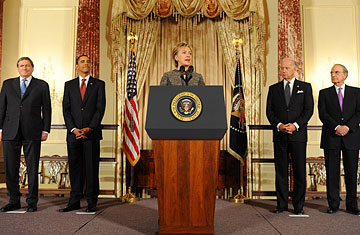
Former Senate majority leader George Mitchell, Vice President Joseph Biden, President Barack Obama and former ambassador Richard Holbrooke look on as Secretary of State Hillary Clinton speaks during her first full day on the job at the State Department on Jan. 22, 2009
The euphoria that greeted Hillary Clinton's arrival at the State Department on Thursday was not unfamiliar. Every few years, the usually reserved diplomats at Foggy Bottom drop their world-weariness and get all googly-eyed over a new leader: When Colin Powell took charge in January 2001, he was mobbed by starstruck Foreign Service officers hoping he'd reverse the department's diminishing stature under Warren Christopher and Madeleine Albright. In early 2005, their adulation was even more desperate as they greeted Condoleezza Rice following Powell's four-year emasculation at the hands of Defense Secretary Donald Rumsfeld and Vice President Dick Cheney.
What the downcast diplomats really seek is someone who will return the State Department to the central role it played in the days when American diplomacy shaped the most important world events. And they embraced Secretary Clinton with fervor, as she arrived promising a new era of robust diplomacy. With President Barack Obama and Vice President Joe Biden at her side, she underscored that promise by announcing the appointments of two high-powered envoys to take charge of diplomatic efforts in key hot spots: Richard Holbrooke was named Special Adviser on Afghanistan and Pakistan, while Senator George Mitchell was named special envoy for the Middle East. (See pictures of Hillary Clinton's presidential campaign.)
But as much as the envoys' appointments raise hopes for renewed vigor in American diplomacy, they raise questions, too: What are their briefs, and does the appointment of either, in itself, signal that the Obama Administration plans to adopt new approaches? To whom will they report, and will deploying two such big-name players result in conflict with their bosses or counterparts elsewhere in the bureaucracy? "It shows that given the enormity of the challenges [Clinton] faces, she's not scared to get the highest-caliber people," says Daniel Levy of the New America Foundation. "But how do you make it work?"
There are reasons to be optimistic that Holbrooke and Mitchell, and Clinton herself for that matter, are part of a new beginning for American diplomacy. Obama made the rejuvenation of diplomacy a centerpiece of his campaign, and he has named a serious and strong-willed team whose members hate to fail. Both envoys are known to be energetic in the field and have records of peacemaking achievement: Holbrooke in brokering the Dayton Peace Accords that ended the Bosnia conflict, Mitchell in negotiating the Good Friday Agreement that marked the beginning of the end of the sectarian conflict in Northern Ireland.
Some see Mitchell as representing a change in approach to the Middle East. Abraham Foxman, the national director of the Anti-Defamation League, told New York's Jewish Week that he was "concerned" because Mitchell's "meticulously evenhanded" approach — he was tasked with formulating proposals to restore the Israeli-Palestinian peace process during the upsurge of violence that followed the failed Camp David summit in 2000 — could represent a break from a policy based on U.S. support for Israel. Gaith al-Omari, a former Palestinian negotiator, says Mitchell's appointment "does send a very good signal, and it's creating some excitement among Palestinians."
Those who believe that an effective peace process will require that the U.S. talk to Hamas are finding hope in the Mitchell selection. Reflecting two years ago in the International Herald Tribune on his experience in Northern Ireland, Mitchell wrote, "Including in the political process those previously associated with violent groups can actually help. Sometimes it's hard to stop a war if you don't talk with those who are involved in it." Clinton and Obama have, however, insisted that the U.S. will not talk with Hamas until the group renounces violence, recognizes Israel and agrees to abide by previous Palestinian agreements. And on Friday, Clinton is expected to announce another key adviser in Dennis Ross, who has taken a hawkish view on engaging Hamas. Conflicts within this group of players in the new Administration seem almost inevitable. (See who's who in Barack Obama's White House.)
Holbrooke, for his part, faces the unenviable task of trying to get the antagonistic governments of Pakistan and Afghanistan to work together against al-Qaeda and the Taliban. That inevitably requires navigating the fraught relationship between Pakistan's civilian government and its security establishment and the rising tensions with neighboring India following last year's Mumbai terrorist attacks. Clinton described Holbrooke's role in broad terms, saying he would coordinate "across the entire government an effort to achieve U.S. strategic goals," including working with military leaders, foreign aid workers and diplomats in the region. Holbrooke, more than any other diplomat of his generation, is known for his effectiveness but also his relentless leveraging of power and authority to achieve his ends. He was a key foreign policy aide to Clinton during her primary campaign, but controlling him now will be difficult: expect shoving matches among the envoy, the military and USAID, which has helped pour billions of dollars in U.S. assistance into Afghanistan over the past eight years. Holbrooke on Thursday made a point of calling Clinton his "boss."
If the weary diplomats at the State Department want nothing more than action on the diplomatic front, they're certainly going to get it from Holbrooke and Mitchell. Whether the two men will actually succeed may depend on the policies that guide their efforts and on Clinton's skills in managing them. She had a simple message for everyone at Foggy Bottom on her first day at work. "This is a team," she told the gathered diplomats. "We are not any longer going to tolerate the kind of divisiveness that has paralyzed and undermined our ability to get things done for America." Says Levy of the New America Foundation: "I think you can make it work."
See pictures of the world's reaction to Obama's Inauguration.
